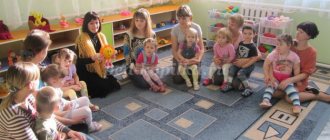Nursery group: what is important for parents to know?
In the vast majority of cases, parents receive a ticket to kindergarten when the child reaches 3-4 years of age. This age is considered optimal for the baby’s successful adaptation to a new children’s society. But there are often cases when parents are forced to go to work earlier and the baby has to be handed over to educators already at 1.5-2 years.
The main criterion for distributing children into groups in kindergarten is their age. Each age category has its own level of physical, mental and social development, its own types of leading activities and specific needs. So, children whose age has not reached 3 years old enter the nursery group of the kindergarten.
What is important for parents of 1.5-2.5 year old children to know when entering a nursery?
Entering kindergarten, especially at such a young age, is extremely stressful for children and their parents. Whatever the circumstances, parents are simply obliged to prepare the baby for nursery in advance. Only in this case, the baby’s adaptation to kindergarten will be as painless as possible.
What is the peculiarity of training 1.5-2.5 year old children?
According to psychologists, at the age of 1.5-2.5 years, babies are very strongly attached to their mother, they do not yet have the need to communicate with peers. That is why the nursery becomes extremely stressful and challenging for such children, which can cause severe depression in them and contribute to the occurrence of a number of diseases. Children aged 1.5 and 2.5 years can get into one group of nurseries. In terms of their development, awareness and thinking, these two age categories are very different.
Features of 1-1.5 year old children
For a child at this age, the main person is the mother. They are not yet as independent as older children. Despite the obvious desire to expand his social circle, the baby is still very attached to his parents. He needs to feel his own shoulder nearby, to be sure that everything will be in order, that nothing will threaten his research and endeavors.
This is the period when the baby is just beginning to separate from his mother and recognize himself as a separate person with his own desires and needs. At 1.5 years old, the baby is just beginning to develop speech; he cannot yet express his thoughts, desires and needs. Any misunderstanding on the part of others can cause real hysterics in a child. And if parents have learned to somehow understand their child, then it will be much more difficult for educators in this regard.
If you decide to send your baby away at the age of 1.5 years, create optimal conditions for successful adaptation to the nursery. Adhere to the principle of gradualism. Teach your child to stay in a new children's group for a short time and gradually increase it. To begin with, you can come to the group for just 15 minutes, the next day for 30 minutes, and so gradually increase the time you spend in the group.
Features of children 2-2.5 years old
After 2 years, the child becomes a real member of society with his own opinions, emotions and feelings, and character traits. Children at this age are already significantly more developed than their younger classmates. They have a richer vocabulary, which means it is easier for them to express their desires and feelings. The need to communicate with other children increases. For all their apparent independence, they are still strongly attached to their mother. Separation from a loved one causes anxiety and anxiety in the baby, but now he calms down much faster. The baby makes contact with an unfamiliar adult more easily, feeling a friendly attitude towards him. However, despite better development and socialization, a 2-2.5 year old baby is not yet mature enough to visit the garden. Sending a baby to a nursery at this age is more of a forced measure than a norm.
If the teacher is an excellent psychologist and finds an approach to your baby, and the child is quite sociable, then adaptation to the nursery will go quickly.
Are there any advantages to children attending a nursery?
If you still have to send your child to a nursery, don’t be upset. For all the disadvantages of visiting the garden so early, there are also advantages. Since there are children of different ages in the group, and the difference per year for this category of preschoolers is significant, the younger children will quickly begin to adopt skills and abilities from their older classmates: washing their hands, eating, asking or going to the potty, etc. Due to their tendency to imitate, younger people gradually adopt all the positive qualities of their elders. The development of children in a children's group, where older children are present, significantly accelerates their development.
How to properly prepare a child for nursery and what is needed for this?
If entering a nursery is an inevitable stage in your child’s life, parents are required to make every effort to get through this difficult period as quickly and painlessly as possible. The success of the child’s future stay in kindergarten will depend on how competently parents approach adaptation.
- The first thing you need to prepare your baby for is the absence of his mother. A few months before entering the nursery, leave your baby with relatives for a few hours. This will be a kind of “training for parting with mom” before the nursery.
- Since toddlers are still quite small, at home they have just begun to wean themselves off pureed foods. Start gradually replacing cereals and purees with chunky food. By the beginning of the nursery group, the child should learn to chew.
- Wean your child off all “Malyshev” devices. Teach him to drink independently from a regular mug, and not from a sippy cup, and to use a spoon. If the baby still has difficulty and carries the spoon past his mouth, it’s okay. He will be able to perfect the skill of putting a spoon directly into his mouth in a nursery.
- Wean your child off diapers. By the time the child enters the nursery group, he should become familiar with the potty and not be afraid of it. Even if at home he asks to go potty every other time, it’s okay. In kindergarten, imitating other children who have been put on the potty, he will quickly master this skill.
- The daily routine of preschoolers necessarily includes an hour of sleep. Tired of himself and his peers, of incoming information and noise, the child needs a daytime nap. In order for the baby in the nursery to be able to fully relax during the nap time and regain his strength, it is necessary to teach him to fall asleep without outside help (without his mother’s rocking motions, pacifiers, etc.).
- Find out in advance at your kindergarten what daily routine the nursery group follows. Start accustoming your baby to such a regime several months before entering kindergarten. This will help the child get used to the new environment faster.
- The same goes for nutrition. It is recommended to start introducing into the child’s diet the dishes that he will receive in the garden. Then, when visiting a nursery, the child’s food will not seem unusual and tasteless.
- Boost your immunity, strengthen your child, spend more time outdoors.
So that the child is not frightened by the environment in which he will find himself, you can introduce him in advance to the kindergarten, to the playground where he will walk, and introduce him to the teacher and classmates.
When placing a baby in a nursery group at such an early age, parents should understand that the baby will often get sick. This is a normal reaction of the body to a new environment and “new” viruses. Be prepared for the fact that if you visit the garden for a week, you will be on sick leave for 2-3 weeks. It is unlikely that you will have to go to work in your first gardening year. Therefore, be patient and put the baby’s interests and health first.
Getting the baby ready for nursery
When handing over the baby into the hands of the caregivers, do not forget to prepare a “dowry” for him, namely:
- 4-5 spare panties;
- T-shirt or T-shirt – 2-3 pieces;
- Tights, socks – 3 pairs;
- A warm jacket in case it’s cold in the group;
- A set of changeable clothes if the child gets wet;
- Pajamas;
- Diaper on the bed;
- Bib;
- Indoor shoes;
- Physical education form;
- Handkerchief, comb.
This is an approximate list of things that a child in a group will need. When you enter the kindergarten, the teachers will give you more precise recommendations on what you need to bring to the nursery.
The nursery group is a difficult stage in a child’s life.
And what emotions a child will remember in kindergarten depends on the teachers, the parents, and the characteristics of the child himself. Return to section



